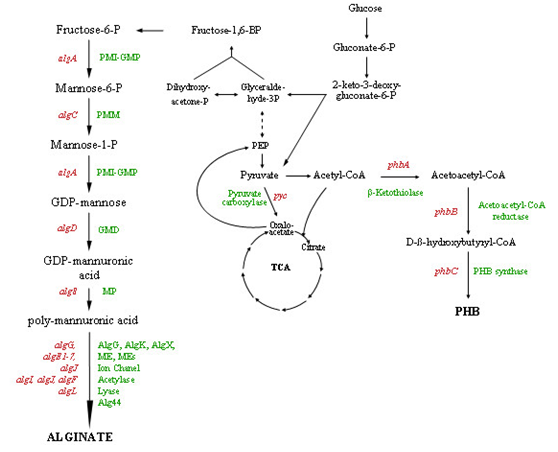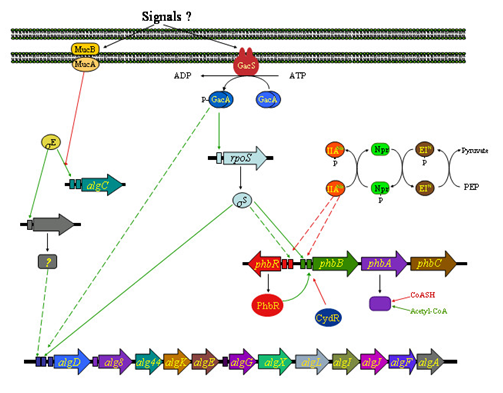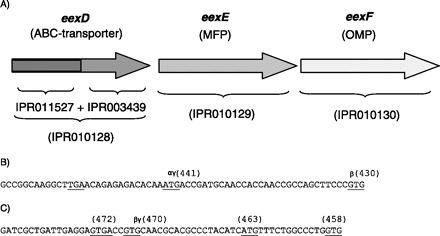IGEM:IMPERIAL/2009/Encapsulation/Phase2/Alginate Biosynthesis/Bacteria2
A.vinelandii
Properties of bacteria
A.vinelandii is non-pathogenic soil bacterium
In its lifecycle, forms a spherical dormant cyst with alginate being important component. The cyst is protective against dessication and environment.
The complete sequence of A. vinelandii genome has recently been sequenced. [1]
Metabolic engineering is currently underway to increase alginate production. [2]
Biosynthesis
basically similar to P.aeruginosa
Main difference is the presence of a larger number of epimerase genes.
Epimerase genes
seven homologous secreted mannuronan C-5 extracellular epimerases AlgE1-7
secreted by bacteria into extracellular environment and acts on polymannuronate
each epimerase produces introduce G with varying patterns
- AlgE2 introduces G-blocks (gel-forming alginate).
- AlgE1 and E6 are also G-block forming enzymes.
- AlgE4 produces alternating MG blocks
the properties of the AlgE epimerases have been extensively studied in vitro after recombinant expression in Escherichia coli[3]
the AlgE epimerase has been cloned into E.coli to produce epimerase. The epimerase was purified and mixed with alginate to improve the G-block quality of alginate. [4]
transport of epimerase
In silico identification of Type I secretion machineries eexD-F required to transport AlgE epimerase out of cell[4]
inactivation of the genes (eexD–F) encoding a particular Type 1 protein transport system leads to blocked AlgE transport[3]
Useful Papers
- Galindo E, Peña C, Núñez C, Segura D, and Espín G. Molecular and bioengineering strategies to improve alginate and polydydroxyalkanoate production by Azotobacter vinelandii. Microb Cell Fact. 2007 Feb 16;6:7. DOI:10.1186/1475-2859-6-7 |
- Steigedal M, Sletta H, Moreno S, Maerk M, Christensen BE, Bjerkan T, Ellingsen TE, Espìn G, Ertesvåg H, and Valla S. The Azotobacter vinelandii AlgE mannuronan C-5-epimerase family is essential for the in vivo control of alginate monomer composition and for functional cyst formation. Environ Microbiol. 2008 Jul;10(7):1760-70. DOI:10.1111/j.1462-2920.2008.01597.x |
- Ertesvåg H, Doseth B, Larsen B, Skjåk-Braek G, and Valla S. Cloning and expression of an Azotobacter vinelandii mannuronan C-5-epimerase gene. J Bacteriol. 1994 May;176(10):2846-53. DOI:10.1128/jb.176.10.2846-2853.1994 |
- Gimmestad M, Steigedal M, Ertesvåg H, Moreno S, Christensen BE, Espín G, and Valla S. Identification and characterization of an Azotobacter vinelandii type I secretion system responsible for export of the AlgE-type mannuronan C-5-epimerases. J Bacteriol. 2006 Aug;188(15):5551-60. DOI:10.1128/JB.00236-06 |
- Setubal JC, dos Santos P, Goldman BS, Ertesvåg H, Espin G, Rubio LM, Valla S, Almeida NF, Balasubramanian D, Cromes L, Curatti L, Du Z, Godsy E, Goodner B, Hellner-Burris K, Hernandez JA, Houmiel K, Imperial J, Kennedy C, Larson TJ, Latreille P, Ligon LS, Lu J, Maerk M, Miller NM, Norton S, O'Carroll IP, Paulsen I, Raulfs EC, Roemer R, Rosser J, Segura D, Slater S, Stricklin SL, Studholme DJ, Sun J, Viana CJ, Wallin E, Wang B, Wheeler C, Zhu H, Dean DR, Dixon R, and Wood D. Genome sequence of Azotobacter vinelandii, an obligate aerobe specialized to support diverse anaerobic metabolic processes. J Bacteriol. 2009 Jul;191(14):4534-45. DOI:10.1128/JB.00504-09 |


